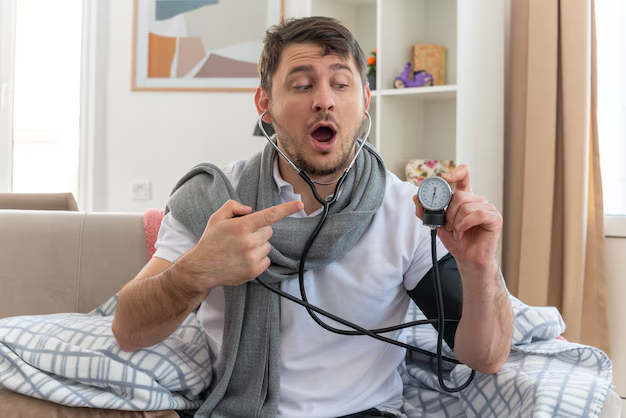Your Guide to Does Hypertension Cause Sleep Apnea
What You Get:
Free Guide
Free, helpful information about HyperTension FAQ and related Does Hypertension Cause Sleep Apnea topics.
Helpful Information
Get clear and easy-to-understand details about Does Hypertension Cause Sleep Apnea topics and resources.
Personalized Offers
Answer a few optional questions to receive offers or information related to HyperTension FAQ. The survey is optional and not required to access your free guide.
Can High Blood Pressure Lead to Sleep Apnea? Here's What You Need to Know
If you've been diagnosed with hypertension, you might be wondering about its potential impact on sleep. Specifically, can high blood pressure cause sleep apnea? While it doesn't directly cause the condition, hypertension and sleep apnea are interconnected in a complex relationship that can significantly affect overall health.
Understanding the Connection
Hypertension, commonly known as high blood pressure, is a chronic condition where the force of the blood against your artery walls is high enough that it may eventually lead to health problems, such as heart disease. Sleep apnea, on the other hand, is a disorder in which breathing repeatedly stops and starts during sleep. The most common type, obstructive sleep apnea (OSA), occurs when the throat muscles intermittently relax and block the airway during sleep.
The Link Between Hypertension and Sleep Apnea
While hypertension doesn’t directly cause sleep apnea, studies show that the two conditions often coexist. Here's why:
- Interrupted Sleep Patterns: OSA can cause fragmented sleep, leading to increased stress and, consequently, potentially elevating blood pressure.
- Sympathetic Nervous System Activation: Every time a person with sleep apnea struggles to breathe during sleep, the body's fight-or-flight response can trigger, raising blood pressure as a result.
- Inflammation and Oxidative Stress: These factors, common in sleep apnea, can also contribute to the development of hypertension.
Research indicates that people with untreated sleep apnea have higher rates of hypertension. Conversely, controlling hypertension cannot necessarily prevent sleep apnea, but managing one condition can sometimes lead to improvements in the other.
Proactive Steps for Better Health
Addressing both sleep apnea and hypertension requires a comprehensive approach. Here are some steps to consider:
- Weight Management: Maintaining a healthy weight can alleviate both conditions.
- Regular Exercise: Physical activity can help lower blood pressure and improve sleep quality.
- Limit Alcohol and Quit Smoking: Both habits can exacerbate hypertension and sleep apnea.
- Adherence to Treatment Plans: Using a CPAP (Continuous Positive Airway Pressure) machine for sleep apnea and following prescribed medication regimes for hypertension can greatly improve health outcomes.
Beyond the physical health implications, managing these conditions can also have a financial impact.
Exploring Financial Assistance and Resources
Whether you're dealing with the costs of sleep studies, medical devices, or prescription medications, financial stress can be a concern. Understanding available resources can be invaluable.
Financial Aid and Support Options
- 💳 Credit Solutions: Look for credit card options with low interest rates or specific medical expense loans to manage immediate costs.
- 🏛️ Government Programs: Investigate government-sponsored healthcare plans that might cover treatments for sleep apnea or hypertension.
- 📚 Educational Grants: If you're a student, check if your institution offers health grants or programs that could alleviate some of these costs.
- 🏥 Health Advocacy Organizations: Nonprofits often provide support or connect you with resources at reduced costs.
- 👥 Support Groups: Community support groups might offer resources or recommend affordable services based on collective experiences.
Understanding the relationship between hypertension and sleep apnea and the avenues for financial support can greatly improve one’s quality of life. Managing your health doesn’t have to come with insurmountable stress, and resources are available to help you on your journey. Prioritize your health by consulting with healthcare professionals and exploring all potential avenues for support.
What You Get:
Free HyperTension FAQ Guide
Free, helpful information about Does Hypertension Cause Sleep Apnea and related resources.

Helpful Information
Get clear, easy-to-understand details about Does Hypertension Cause Sleep Apnea topics.

Optional Personalized Offers
Answer a few optional questions to see offers or information related to HyperTension FAQ. Participation is not required to get your free guide.


Discover More
- a 66 Year Old Female With a History Of Hypertension
- Are Eggs Bad For Hypertension
- Are Eggs Good For Hypertension
- Are Endocrine Disorders Causing Hypertension Rare
- Can Adderall Cause Hypertension
- Can Alcohol Cause Hypertension
- Can Allergies Cause Hypertension
- Can Anemci People Get Hypertension
- Can Anemia Cause Hypertension
- Can Antibiotics Cause Hypertension
